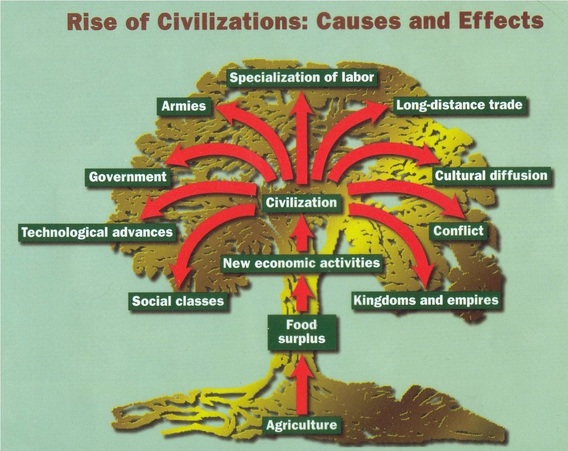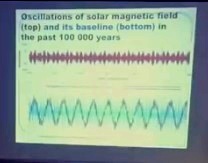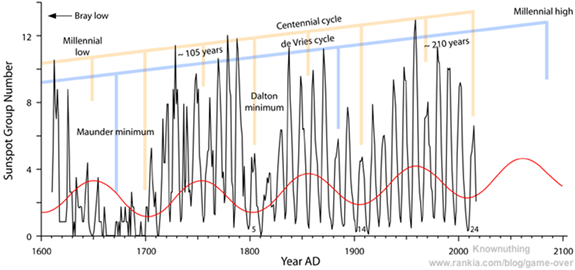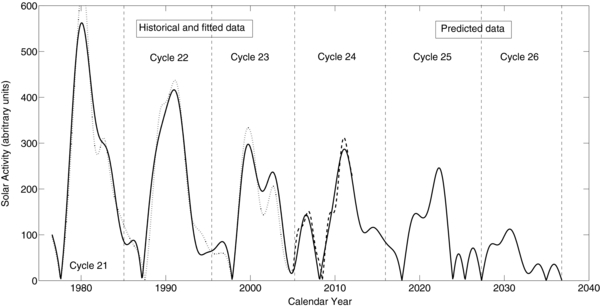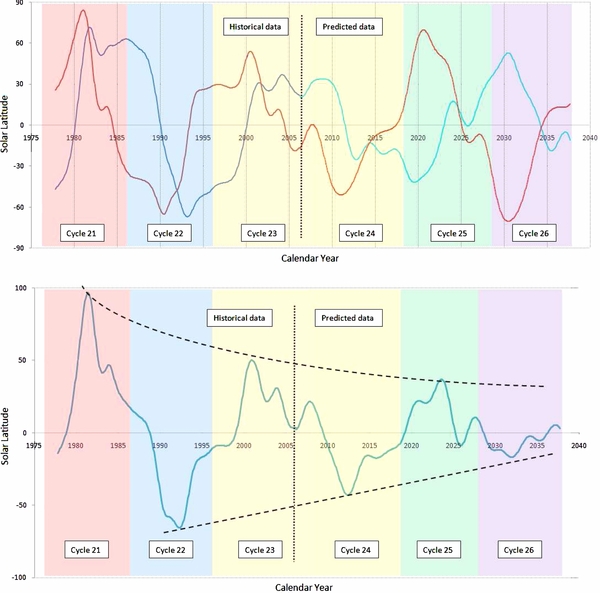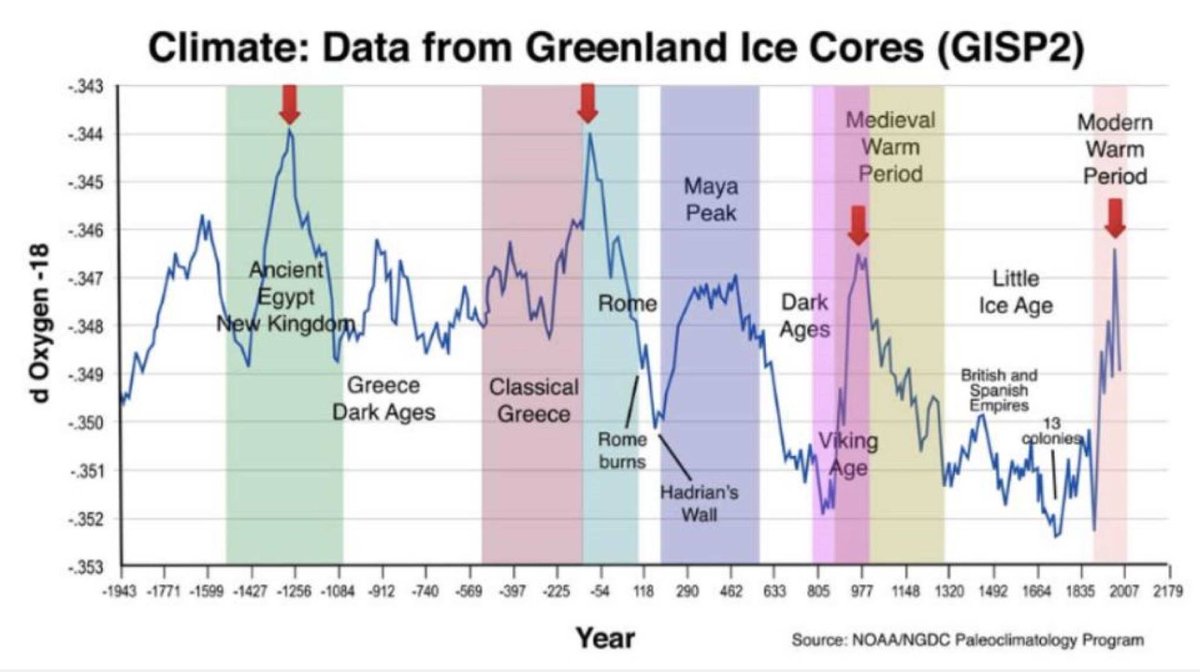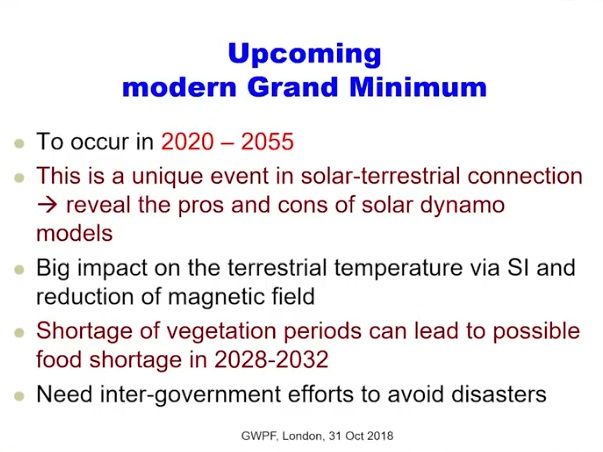 Professor Valentina Zharkova presented at the Global Warming Policy Forum, and this is what happens when someone familiar with Grand Solar Minimums and effects on society tries to warn about global food insecurity by 2028, threats to stay silent. Giraffes in snow, atmospheric compression events and uber extremes are a wisp of what is in store through the next decade…….. Did I mention food prices?
Professor Valentina Zharkova presented at the Global Warming Policy Forum, and this is what happens when someone familiar with Grand Solar Minimums and effects on society tries to warn about global food insecurity by 2028, threats to stay silent. Giraffes in snow, atmospheric compression events and uber extremes are a wisp of what is in store through the next decade…….. Did I mention food prices?
Solar Researchers Try to Warn About Global Food Shortages
If you're one of my patrons, take a look in your email box. I sent you a six-page report detailing the exact same forecast, timelines and also things to think about, as society moves forward, and people become more aware of the situation around them.
How is economy going to behave? How are people going to pull money out of their savings stocks? Whatever it is, the economy is going to contract. And how are people going to react once they realize that this is a decade-long event and they are on their own to prepare their own food and to organize communities?
We'll also see how this gargantuan shift affects perception of what's possible in terms of solutions.
As it's always been said, food surplus gives rise to civilizations. You'll find this through history, every time there's excess agriculture production, civilizations rise and flourish. However, when there's not enough food, they contract or collapse. This has been seen through tens of thousands of years of history.
Speaking of incredibly long timelines, during Professor Zharkova's presentation, this image, for some reason, was blocked out. I've linked below the rest of the presentation so you can go right to the video of Global Warming Policy Foundation. Check out this entire presentation. Excellent! Except when it comes to this and one other slide, which talked about long time durations and repeating cycles, were suddenly obscured.
During the question and answer session, there was an incredibly overblown and overexposed image of this. I was able to enhance it and this is what we have. Oscillations of the solar magnetic field. This is what Professor Zharkova had done with her team, gone back at least a hundred thousand years looking at magnetic fields on the Sun.
You can see this clearly points to the Electric Universe. The magnetic oscillation waves show this has nothing to do with an internally combusting star, it is an electrical wave in front of you. She also mapped that out into Grand Glaciation Cycles going back 400,000 years.
We have this incredibly long timeline to get a baseline, if you will.
Looking at the realization of 400 year segments in time and all the cycles interwoven within just these last 4 centuries, think about 400,000 years. If you're going to map that out, this 400 years of time would literally be just a pencil mark in time. Even if your graph was a six feet long, this would still be pencil-mark in thickness of the amount of time in that entire cycle of Grand Glaciation Cycles.
Her forecast stands as Solar foot Cycle 25 declining and Solar Cycle 26 almost no agricultural production from 45 north latitude and above.
To put that into context this year alone, the global wheat crop was reduced between 5 and 8%; rye is also down by 30%, rice down for about 5%, but others like corn and soy have great harvests.
As we progress between now and 2028, it's not going to be as if on January 1st, 2028, there will be a sudden food scarcity on the planet. It's going to lead up to this. It's going to be a lead-in to that point of scarcity.
The question you might want to ask yourself is, over these next ten years, is it going to be a linear decline or will there be huge drop one year and then the next year it'll flatten out, or maybe two years and then it'll drop off again? It looks like 80 to 90% reduced yields globally of what we're getting right now.
You are here at the big red arrow. You're going to be here for another year or so until we get into Solar Cycle 25. There's a plethora of forecasts out there of the Solar Cycle being a little stronger, about equal or less than this last SC that we've experienced. We have seen massive weather changes in the last year, so as we move forward, if the Solar Cycle is even less intense than predicted, there will be less than 50 sunspots, averaged. We're going to see types of things that haven't been recorded in centuries, that will be occurring on our planet on a daily or weekly play-out of the news.
Take a look at the magnetic fields of the Sun, that's the graph below. When fields get into that wide canceling wave, that's where the extreme weather is. You can see how solar activity declines match that in the graph below.
During the question and answer session, Professor Zharkova referenced that each successive heat spike coming out of these warming events in the past 9000 year is going lower and lower. The modern warm period, I disagree with this chart put out by NOAA and so far it's only 0.2 degrees Celsius above baseline. Where that red arrow is, there should be a drop of at least 1 degree Celsius, possibly 1.3 degrees Celsius which would bring us below the medieval warming period.
With the slide here, please realize that Professor Zharkova has been so tight-lipped about the effects on society of the Grand Solar Minimum.
Suddenly she comes out full force and says, “there is possible global food shortages on 2028 to 2032. You're going to need intergovernmental connection and cooperation to stockpile now for these lean times later”.
Notice the top line also, we're going to taste it, feel it, and smell it in 2020 and it's just going to intensify.
PDF of this Article Solar Researchers Try to Warn About Global Food Shortages
FULL VIDEO Solar Researchers Try to Warn About Global Food Shortages
Join ADAPT 2030 NEWSLETTER https://www.oilseedcrops.org
***Mini Ice Age Conversations Podcast***
- iTunes: https://itunes.apple.com/us/podcast/adapt2030
- Soundcloud: https://soundcloud.com/adapt-2030
- Libsyn: http://adapt2030.libsyn.com/
- BitChute: https://www.bitchute.com/hashtag/adapt2030
- Brighteon: https://www.brighteon.com/channel/adapt2030
- YouTube: https://www.youtube.com/user/MyanmarLiving
- Keep ADAPT 2030 independent: paypal.me/adapt2030
- Patreon: https://www.patreon.com/adapt2030
- Steemit: https://steemit.com/@adapt2030
- Medium: https://medium.com/@globalcooling
- FB: https://www.facebook.com/Miniiceage
- Twitter: https://twitter.com/adapt2030
- GAB: https://gab.ai/adapt2030
- Revolution Radio: Studio A – Thursday Nights – 10 PM to Midnight E.S.T. http://www.Freedomslips.com
- Content Created & Produced by David DuByne https://www.oilseedcrops.org



